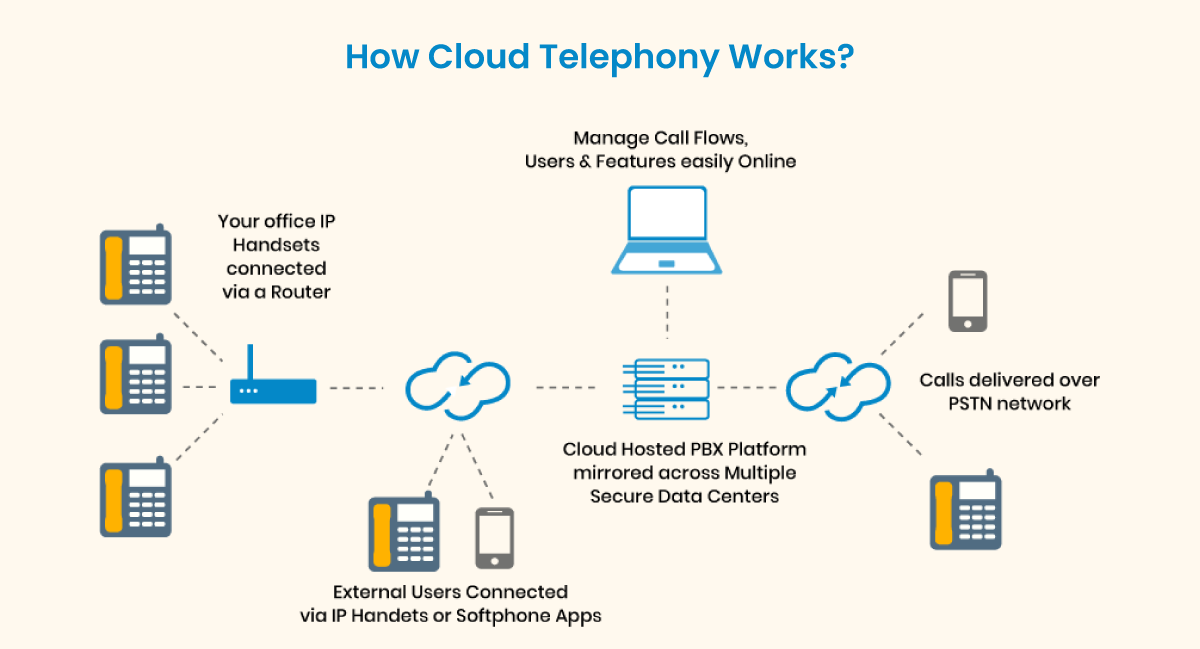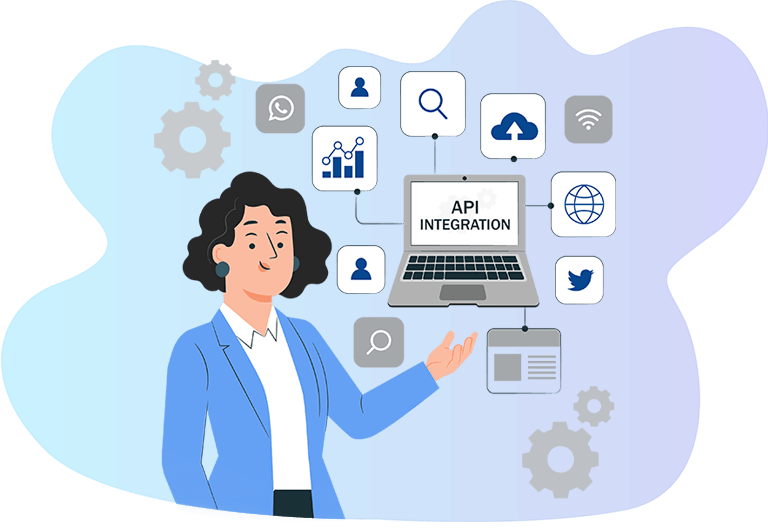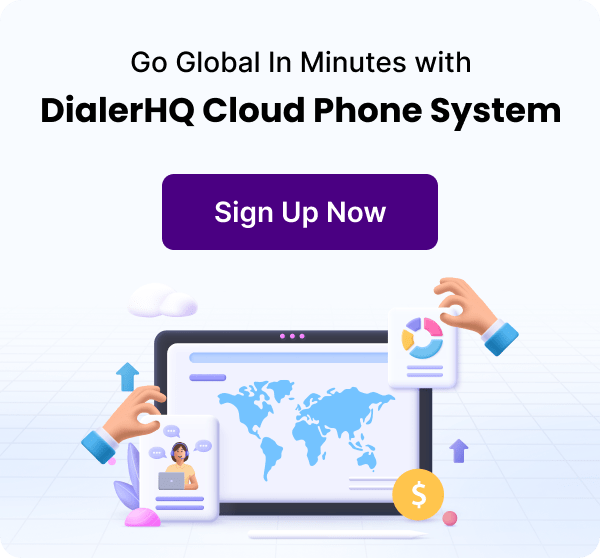Senior Writer: Paras Kela
As businesses strive to improve customer satisfaction and streamline operations, many are turning to cloud contact centers as a solution – a virtual call center that utilizes internet-based technology to manage and route customer interactions, including calls, emails, and messages.
In this blog, we will explore the features and capabilities of cloud contact centers, compare them to traditional call centers, and discuss the benefits they can provide for your business.
We are pretty certain that by the end, you will have a better understanding of whether a cloud contact center platform is the right choice for your company.
Let’s get started with the definition of a cloud contact center solution.
What is a Cloud Contact Center?
A cloud contact center solution can be defined as a type of call center that uses internet-based technology to manage customer interactions. It enables businesses to manage and route customer calls, emails, and messages through a single platform without the need for on-premise hardware or software.
Let’s now move on to the next section to learn how a cloud center works.
How Does a Cloud Contact Center Solution Work?
As mentioned above, a cloud contact center platform uses internet-based technology to handle inbound as well as outbound customer communications.

When a customer contacts a business, the cloud-based contact center solution routes the communication, i.e. call, message, and email, to an appropriate customer service agent, who can then respond to the customer in real time.
One of the key features of a cloud contact center is its ability to route customer interactions to the most suitable agent. Based on factors such as the customer’s language preference, the type of inquiry, or the agent’s expertise, the solution routes incoming calls to an appropriate agent.
Moreover, contact center cloud services can also prioritize customer inquiries based on factors such as the severity of the issue or the customer’s relationship with the business.
In addition to routing customer interactions through IVR (Interactive Voice Response), a cloud contact center platform can also provide agents with cutting-edge tools and resources to assist them in their work. This may include but is limited to a customer relationship management (CRM) system to track customer information and interactions, as well as access to knowledge bases to help them resolve customer inquiries.
Overall, cloud based contact center solutions work by using internet-based technology (known as VoIP) to better manage and route customer inquiries in an efficient manner, allowing businesses to improve their customer service and streamline their operations.
What are the Difference Between Cloud Contact Center vs Cloud Call Center?
The table above compares the key differences between Cloud Contact Centers and Cloud Call Centers. While Cloud Contact Centers offer support across multiple communication channels, such as phone, email, chat, and social media, Cloud Call Centers focus solely on inbound and outbound calls. Cloud Contact Centers also typically offer more features and have a higher cost, while Cloud Call Centers are more cost-effective but have limited functionality.
| Aspect | Cloud Contact Center | Cloud Call Center |
|---|---|---|
| Definition | A cloud based customer support system that manages multiple communication channels such as phone, email, chat, social media, etc. | A cloud based telephony system that handles inbound and outbound calls only. |
| Communication Channels | Multiple communication channels such as phone, email, chat, social media, etc. | Only handles inbound and outbound calls. |
| Features | Provides features such as IVR, call routing, queuing, CRM integration, analytics, etc. | Provides features such as IVR, call routing, queuing, call recording, etc. |
| Use Case | Ideal for businesses that require customer support across multiple channels. | Ideal for businesses that primarily deal with inbound and outbound calls. |
| Customer Experience | Improves customer experience by providing support across multiple channels and reduces wait times. | Improves customer experience by handling calls efficiently and reducing wait times. |
| Scalability | Scalable to accommodate a growing number of channels and agents. | Scalable to accommodate a growing number of agents. |
| Cost | Generally higher due to the additional channels and features. | Generally lower due to the limited functionality. |
| Example Platforms | Zendesk, Freshdesk, Genesys Cloud, Twilio Flex | Five9, Talkdesk, RingCentral, Aircall |
What are the Difference Between Cloud Call Center vs PBX?
The table above compares Cloud Call Center and PBX systems based on various criteria such as infrastructure, scalability, cost, features, integration, mobility, maintenance, reliability, support, and security. It helps businesses understand the differences between the two systems and evaluate which one suits their specific requirements better.
| Criteria | Cloud Call Center | PBX |
|---|---|---|
| Infrastructure | Hosted in the cloud, no on-premise equipment required | On-premise equipment required |
| Scalability | Highly scalable, easily add or remove agents as needed | Limited scalability, may require hardware upgrades to support additional agents |
| Cost | Typically pay-per-user or per-minute pricing, no upfront hardware costs | Upfront hardware costs, ongoing maintenance costs |
| Features | Advanced features such as automatic call distribution, IVR, call recording, and analytics | Basic features such as call forwarding, voicemail, and conference calling |
| Customer Experience | Improves customer experience by providing support across multiple channels and reduces wait times. | Improves customer experience by handling calls efficiently and reducing wait times. |
| Integration | Can integrate with CRM systems and other business applications | Limited integration capabilities |
| Mobility | Agents can work remotely from anywhere with an internet connection | Limited mobility, agents must be physically present in the office |
| Maintenance | Maintenance and updates handled by the provider | Maintenance and updates handled by the company |
| Reliability | Highly reliable with redundancy built-in | Reliability depends on the quality of the equipment and maintenance |
| Support | 24/7 support available | Support depends on the provider and company |
| Security | Data is stored in the cloud with robust security measures in place | Security depends on the quality of the equipment and maintenance |
What are the Benefits of Cloud Contact Center To Your Business?
Cloud contact centers offer a range of benefits, including improved customer experience, increased flexibility, streamlined operations, reduced costs, improved reliability, enterprise-grade security, easier integration, and better analytics and reporting. Let’s look at the cloud contact center benefits one by one in detail.
1. Improved customer experience
A cloud contact center platform offers a range of features and functionalities that can help businesses offer better customer service to their valuable customers. For example, call routing can ensure that customers stay connected to the most appropriate contact center cloud agent based on their needs, such as their language proficiency or expertise in a particular domain.
Key Benefits of Cloud Contact Center Solutions
- Improved customer experience
- Increased flexibility
- Reduced costs
- Streamlined operations
- Improved reliability
- Enhanced security
- Easier integration
- Better analytics and reporting
You May Also Read : Call Center Analytics: A Complete Guide in 2024
This will ensure a more personalized and efficient customer experience, since customers are connected to agents who are best able to assist them. Overall, these features can lead to a more positive and memorable customer experience, resulting in increased customer satisfaction and loyalty.
2. Increased flexibility
As mentioned above, cloud based contact center solutions allow businesses to have a distributed workforce – with customer service agents working remotely from different locations. This can provide businesses with increased flexibility in terms of staffing and operating hours, allowing them to better meet the needs of their customers.
This can be particularly useful for businesses that have a seasonal or fluctuating customer influx or customer volume. Companies can scale up or down the cloud resources as needed without having to maintain their own physical infrastructure. Also, it can be beneficial for businesses that want to offer customer service outside of regular business hours – since agents can work remotely at any time.
3. Reduced costs
Cloud contact centers are generally more cost-beneficial than traditional call centers, as they don’t require businesses to maintain their own physical infrastructure. This can save a significant amount of businesses’ budget on hardware and software (or subscription) expenses, as well as maintenance and repair costs.
Additionally, businesses only pay for the resources they consume rather than having to invest in expensive upfront infrastructure costs. This can help businesses reduce their overall costs and increase their profitability.
4. Streamlined operations
A cloud-based contact center solution can help businesses streamline their operations by offering a single platform for managing customer interactions through IVR (Interactive Voice Response). This can reduce the need for multiple systems and allow businesses to better track and analyze customer data.

This will make it significantly easier for businesses to manage customer interactions and feedback, as everything is in one place. Overall, contact center cloud services can help businesses streamline their operations, leading to increased agent performance and overall efficiency.
5. Improved reliability
A typical traditional call center relies heavily on physical or on-premise infrastructure, which can be prone to outages, downtime and other issues. In the event of outages or during system downtime, the entire customer communications will be disrupted, which will certainly impact the business’s reputation as well.
In contrast, cloud contact center solutions are quite more reliable, as they are maintained by the system providers and can have a backup plan in place to ensure that customer communications can continue even in the event of an outage or other disaster. This can give businesses a sigh of relief, knowing that their customer interactions will be able to continue even in the event of an issue.
6. Enhanced security
No one can deny the fact that customer data is an important asset for businesses as it helps them better understand their strategies over the years. For the very same reason, it is crucial that it is protected from unauthorized access. Fortunately, cloud contact centers can provide enhanced security measures such as data encryption and secure access controls to protect customer data.
This can help businesses ensure that customer data is safe and secure, giving customers trust in the business, besides protecting the business from potential data breaches.
7. Easier integration

A cloud contact center can be easily integrated with other business systems, such as CRM systems as well as customer feedback and workforce management tools. This allows businesses to access and thoroughly analyze with the needs of your customers data in one place rather than having to switch between multiple systems.
This can eventually streamline operations and make it easier for businesses to get a holistic view of customer interactions and feedback.
8. Better analytics and reporting
The next benefit on the list is – better analytics.
Understandably, a cloud contact center platform can provide businesses with real-time analytics and reporting capabilities compared to a traditional one. This will eventually allow businesses to track and analyze customer data in real time, identify trends and areas for improvement and ultimately make informed business decisions.
Besides, it also allows businesses to monitor the real-time performance of customer service agents and identify whether there is a need for training or not. Overall, better analytics and reporting can help businesses improve customer service and optimize operations.
In a nutshell, a cloud contact center can be a valuable tool for businesses looking to improve their operations and customer service.
Top 10 Cloud Contact Center Solutions Comparison [2024]
| Brand Name | Key Features | Pricing | Free Trial |
|---|---|---|---|
| DialerHQ |
|
| 10 Days |
| Callhippo |
|
| 10 Days |
| WebEx |
|
| 90 Days |
| Nextiva |
|
| 10 Days |
| RingCentral |
|
| 14 Days |
| CloudTalk |
|
| 14 Days |
| 8X8 |
|
| 30 days |
| Genesys |
|
| Contact Sales |
| Talkdesk |
|
| 30 Days |
The table compares the features, pricing, pros, and cons of the top 10 cloud contact center solutions: DialerHQ, WebEx, Nextiva, Ringcentral, CallHippo, CloudTalk, 8×8, Genesys Cloud CX, Vonage, and Talkdesk. It helps businesses choose the right solution by comparing their features and pricing.
Conclusion
Cloud contact centers are a cutting-edge solution for modern businesses looking to improve customer satisfaction scores besides streamlining their operations. Using internet-based technology, companies can better manage and route customer interactions, including phone calls, emails, and messages, through a single platform. Besides, its benefits, such as flexibility, cost-effectiveness, and offer advanced features compared to traditional call centers, make it an ideal choice for modern businesses.
FAQs
The key features of a cloud-based contact center solution include scalability, flexibility, real-time monitoring, analytics, and integration with relevant business applications. However, this feature list may vary from business to business.
The three primary types of cloud contact centers are– public, private, and community. Public cloud contact centers are owned by third-party providers, while private ones are owned by a single organization. On the other hand, community cloud contact centers are designed for a specific community with shared interests.
A cloud contact center can improve the customer experience in several ways, including providing a seamless omnichannel experience as well as offering personalized interactions. Besides, it also reduces wait times, increases first-call resolution rates (FCR), and enables self-service options.

Paras Kela is an accomplished IT professional with 7+ years of industry experience, including 4+ years as a dedicated content writer. His expertise lies in crafting informative blogs on VoIP and cloud telephony, among other technical subjects. Outside his professional pursuits, he cherishes quality time with loved ones, indulges in watching documentaries, and finds solace in gardening.
Updated : May 14, 2024

Subscribe to our newsletter & never miss our latest news and promotions.





